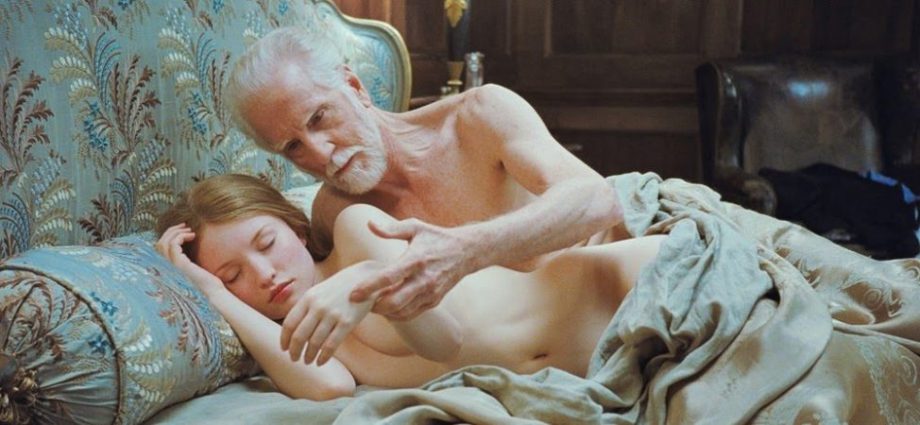| Worth seeing: | for lovers of art-house films who are content to admire beautiful film-making - and women - without really being told why they're bothering |

| Director: | Julia Leigh |
| Featuring: | Emily Browning, Rachael Blake, Chris Haywood, Ewen Leslie, Hugh Keays-Byrne, Peter Carroll, Sarah Snook |
| Length: | 101 minutes |
| Certificate: | 18 |
| Country: | Australia |
| Released: | 14th October 2011 |
WHAT’S IT ABOUT?
University student Lucy (Emily Browning) is about to get kicked out of her digs as she can’t afford the rent.
She works menial jobs and takes part in scientific experiments to earn a bit of extra cash, but it’s not enough to get by.
Spotting a job advert in the student paper, she calls up for information and soon finds herself being whisked off to a remote country mansion where a prim, smartly-dressed woman, Clara (Rachael Blake), looks her over and offers her some work.
She starts off as a waitress at top-end dinner parties – but not just any kind of waitress – a topless one. In fact all of the waitresses, serving these wealthy diners are wearing the kind of underwear that wouldn’t look out of place in a bondage dungeon.
Once the money starts coming in – and it’s big money – she moves to a gold-fish-bowl high-rise apartment with a view.
As she becomes more trusted, Clara starts giving her the better paid jobs. She’s chauffeured to the mansion, showers, takes a drug that puts her to sleep and wakes up several hours later, having no idea what’s happened to her. But we know.
She lies there asleep, naked – a sleeping beauty, while men – mostly the old and ugly kind who couldn’t otherwise dream of hooking such a goddess – get to spend the night with her – under Clara’s strict rules.
But despite loving the money that’s coming in, Lucy’s curiosity gets the better of her and she starts to break the strict rules herself, to try to find out.
WHAT’S IT LIKE?
It’s very difficult to know what to make of this film and the press notes serve only to confuse and annoy rather than to illuminate.
We’re told that a disheartened young university student takes a job as a “sleeping beauty” like we know what one of these is. Perhaps everyone in Australia knows that a “sleeping beauty” is a girl who sleeps naked and allows her body to be enjoyed by anyone who pays enough. But not round my parts. The closest I’ve come to the phrase was at West Hollywood’s Standard hotel, where a bikini-clad beauty sleeps (or reads) in a vivarium behind the reception desk. But a film about that wouldn’t be quite as creepy.
And this is very creepy. Seeing a beautiful young women voluntarily being drugged and allowing her boss to do with her what she will is bad enough, but seeing ugly, old men licking her face or stubbing out their cigarettes on her is almost unwatchable. Which for an art-house film is no bad thing – it’s provocative and a visual and cerebral challenge.
But such a challenge requires a pay-off. Our efforts need to be rewarded. And they’re not.
Very little is explained, which may well be an artistic statement of sorts, but it means we never really get to know enough about our protagonist and her plight to care about her. We see that she has only one friend – an alcoholic – but we don’t get to understand any of the intricacies of their relationship. We see some other odd practices in which she indulges and watch her behave in a way which doesn’t particularly engender sympathy – and when it comes to the sleeping beauty aspect of the film, if we trust Clara, we know her strict rules will ensure that nothing too bad is going to happen to her, which removes much of the possible tension.
We’re told, in the press notes, that there’s a gradual build-up of curiosity, but this is unclear. Narratively, one minute, she seems content to carry on with what she’s doing and suddenly, she’s changed her mind. There’s no suggestion as to why. We don’t feel any progress in Lucy’s character. There were also inconsistencies, such as rules that were drummed into her by Clara not having any consequences.
Is it a film about desperation? About loneliness? About trust? It should be about all of them, but it doesn’t feel about any of them.
As I feared, moments before the screen cut to black, it – indeed – ended without answering any questions, many of them posed by the final scene.
The cinematography can’t be faulted and the performances of the two leads – Emily Browning and Rachael Blake – fit the film perfectly, if not enlighten us about their characters. The use of music – or lack thereof for much of the film – is unusual and serves, if nothing else, to highlight the importance of music to the soundtrack of most other films.
It’s very sexual – but oddly not very explicit.
It’s artistic, pleasing to the eye, but unsatisfying for the mind. In many ways, perhaps, just what you might expect from a film that’s part of the official selection at Cannes.
Returning to the press notes, the director Julia Leigh acknowledges that the film doesn’t explain itself but says she doesn’t like to have to explain herself. But with so much left unsaid, it feels more like an excuse for making an incoherent art film after the event than a compelling piece of artistic storytelling.
Perhaps the biggest question left unanswered is what on earth was the job description she answered in the classified advert in the student magazine?
